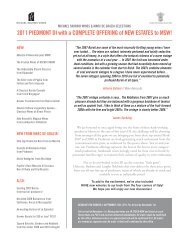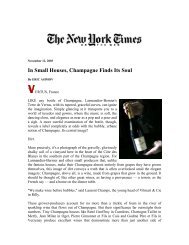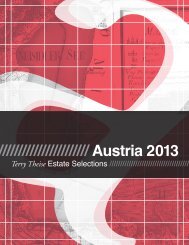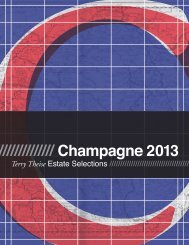German Catalog 2006 USE THIS ONE.qxp - Michael Skurnik Wines
German Catalog 2006 USE THIS ONE.qxp - Michael Skurnik Wines
German Catalog 2006 USE THIS ONE.qxp - Michael Skurnik Wines
Create successful ePaper yourself
Turn your PDF publications into a flip-book with our unique Google optimized e-Paper software.
106<br />
the matter of “globalization”<br />
The matter of globalization in wine seems to<br />
put certain people on the defensive. This is<br />
regrettable, not least because defensive people<br />
often lash out, and a dialogue which ought to be<br />
able to be conducted civilly ends up being conducted<br />
evilly. Robert Parker’s recent essay, posted<br />
on his website, contained many reasonable<br />
and persuasive points, the value of which was<br />
diminished by an intermittent tone of invective.<br />
All intellectuals aren’t “pseudo-intellectuals” (I<br />
wonder how he tells them apart) and all persons<br />
taking views contrary to his aren’t guilty of membership<br />
in the “pleasure-police.”<br />
I’ll try to summarize the positions of the two<br />
camps. Critics of globalization in wine are actually<br />
suspicious of a uniformity of wine-styles<br />
they perceive has arisen over the past roughly-20<br />
years. For the sake of brevity, let’s call these people<br />
“romantics.”<br />
Proponents of globalization—let’s call them<br />
“pragmatists”—argue that wine in the aggregate<br />
has never been better, and that good wines are<br />
hailing from a larger number of places than ever<br />
before. They do not perceive a problem, and<br />
think a bunch of fussbudgets are trying to rain<br />
on their parade.<br />
Romantics would counter that the sense of<br />
multiplicity is misleading, because it’s actually<br />
the same type of wine hailing from all these<br />
new places.<br />
I cannot reasonably deny the validity of the<br />
pragmatist’s argument. There are certainly many<br />
more competent and tasty wines (and concomitantly<br />
fewer rustic, dirty or yucky wines) than<br />
there were twenty years ago. Yet I can’t help but<br />
wonder; certainly the floor has been raised on<br />
overall wine quality. But has the ceiling been<br />
lowered? That, I interpret, is the romantic’s argument.<br />
But not all of it.<br />
Baseball fans are cruelly aware of the steroid<br />
scandal threatening the basic integrity of the<br />
sport. We are sometimes less aware of the role<br />
we ourselves have played in bringing this about.<br />
We seem to want to wish it all away. We enjoy<br />
the prospect of herculean demi-gods bulked up<br />
on chemicals hitting baseballs 500 feet. This is<br />
becoming our Ideal, and players embodying this<br />
ideal put butts in the seats and command the<br />
largest salaries. They are also the envy of other,<br />
less “enhanced” players, some of whom seek to<br />
climb on board the gravy train.<br />
I see a metaphor here. There is no doubt<br />
that the prevailing recipe for modern wines<br />
with commercial aspirations effectively seems<br />
to churn them out; ripe, sweet, softly embedded<br />
tannins, large-scaled and concentrated. The<br />
pragmatists care less about how such wines get<br />
that way than they do about being entertained<br />
and thrilled by juiced-up sluggers hitting the<br />
ball 500 feet.<br />
I’ll yield this argument is properly conducted<br />
in shades of gray. Parker has often expressed<br />
his esteem and admiration for moderate, elegant,<br />
temperate wines. He typically scores them<br />
in the high 80s, and has told me he wishes more<br />
people prized and drank such wines. Yet he<br />
must be aware the commodity called a “Parkerscore”<br />
in fact damns such wines with faint<br />
praise. And though he admires these wines well<br />
enough, he reserves his love and expressive<br />
emotionality for their bigger, more hedonistic<br />
cousins.<br />
Thus a particular idiom becomes the prevailing<br />
idiom, because everyone wants the<br />
scores and the financial success they engender. It<br />
is the singular persuasiveness of this monoidiom<br />
against which the romantics struggle.<br />
They—we—are innately wary of uniformity, as it<br />
is contrary to nature. We are also alert to an<br />
insidious effect such uniformities can create. We<br />
risk becoming passive, infantilized, dulled.<br />
When all things are one single way there’s less<br />
need to pay attention to them, for they no longer<br />
can surprise you.<br />
Pragmatists will claim I am overstating the<br />
case; none of them argues that all wines should<br />
taste the same. Fair enough. Yet they themselves<br />
often accuse romantics of wishing to return to<br />
some imagined Eden of dirty, weird and rustic<br />
wines (which, they sneer, we excuse by citing terroir).<br />
The dialogue threatens to reduce to a war<br />
of straw men.
















